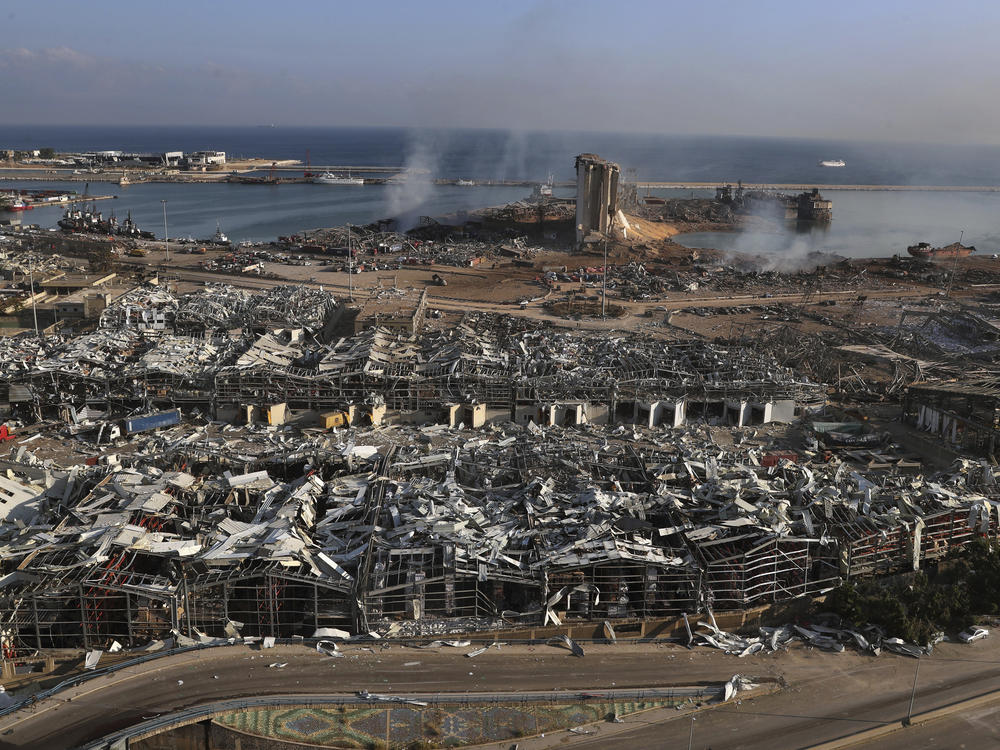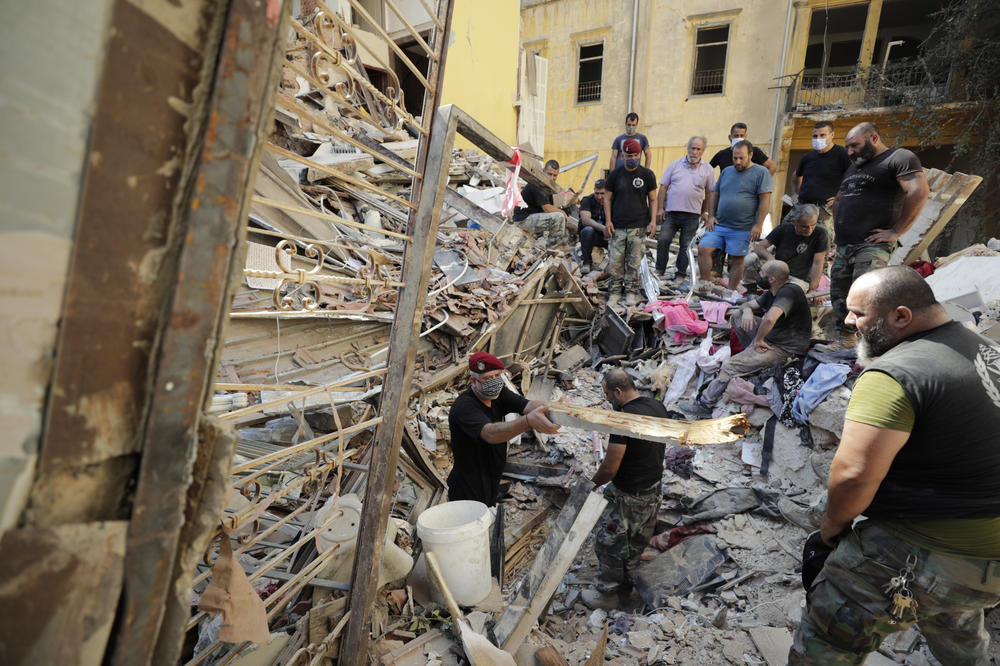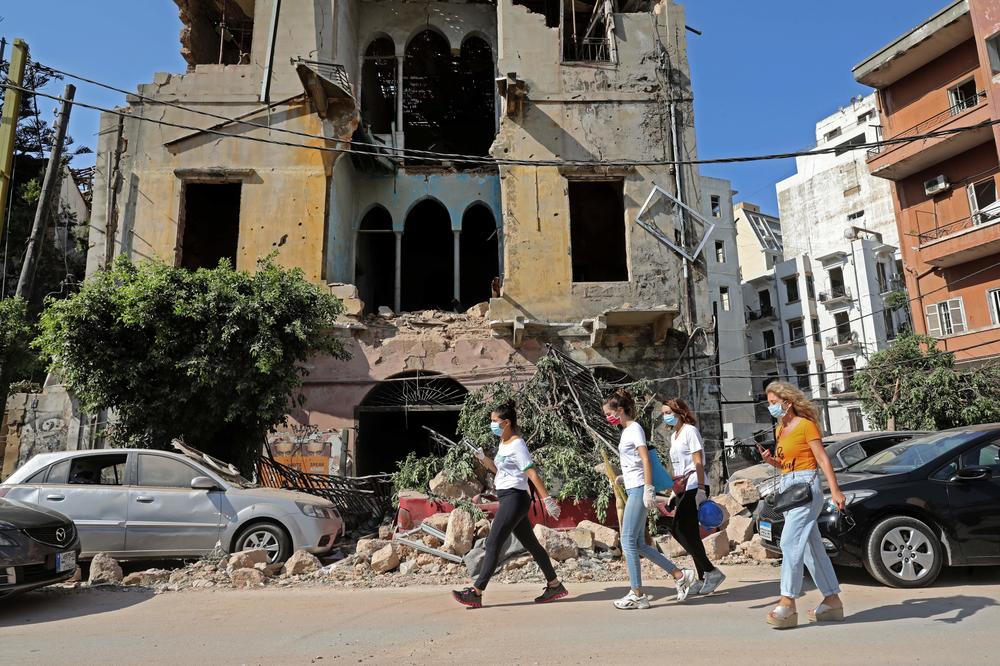Section Branding
Header Content
'No Words': After Enormous Explosion Rips Beirut, A Search For Answers
Primary Content
Updated at 4:53 p.m. ET
Beirut is reeling and Lebanon is in grief after a powerful explosion tore through the capital's port area on Tuesday. The enormous blast, which officials said was driven by thousands of tons of ammonium nitrate, killed at least 135 people and injured thousands more. Emergency crews are still working to find all the victims.
"No words can describe the horror of the disaster that has hit Beirut last night, turning it to a disaster-stricken city," Lebanese President Michel Aoun said Wednesday.
Video recordings captured Tuesday's explosion, which followed a smaller blast and fire in a warehouse at the port. The explosion created an immense shock wave that shattered windows and was felt for miles around.
Aerial footage shows the port and surrounding neighborhoods are now a wasteland of devastated buildings and crushed vehicles. With smoke still rising at the blast site, rescue workers are digging through the rubble in search of victims trapped underneath. Families have posted pictures of loved ones on an Instagram page that's been set up for the missing.
Ammonium nitrate is the same raw material Timothy McVeigh used to bomb the Alfred P. Murrah Federal Building in Oklahoma City in 1995. In that deadly attack, 2 tons of the fertilizer were used. The Beirut port was holding an estimated 2,750 tons of ammonium nitrate, Aoun said.
The explosion "disfigured Beirut" and "shocked the whole world," the president said. Lebanon's flag is now flying at half-staff at Baabda Palace and other government buildings.
Health officials said the blast killed 135 people and wounded about 5,000. The city's governor told local media that the blast, which was heard over 50 miles away, has "destroyed more than half the Lebanese capital." Hundreds of people have been left homeless, he said. The blast was so strong that it was felt in Cyprus, more than 100 miles away in the Mediterranean Sea.
Among the injured was Dion Nissenbaum, a reporter with The Wall Street Journal, who was at home with his 4-year-old daughter when the explosions hit. Despite being a half-mile away, both suffered cuts, and Nissenbaum's daughter remains in the hospital.
In an interview on NPR's Morning Edition, Nissenbaum relayed how the situation unfolded. He was taking his daughter to the bathroom, he said, when he heard the initial explosion.
"It sounded a lot like a car bomb that I've heard in reporting in places like Kabul, and even Istanbul. I went out into the living room to call my colleagues to find out what it was. And my daughter came running out naked into the living room to say, 'What was that?'
"And then the blast, the second blast, the much more powerful blast, just blew in the glass, and the doors and everything in our house. And I just had to dive to the ground and use my body to shield her from as much of the glass and wood that was just ... blew into our house and then blew back the other way, somehow. It blew through our house and then like, ricocheted off the building behind us and tossed my computer and our sofa out into the front of the street. It was unlike any blast I've ever experienced."
Nissenbaum said both he and his daughter required sutures and are still in shock. "But thank goodness we're all alive, as well as my wife, who's a doctor here with the Red Cross who basically helped save my daughter's life."
Even before the explosion, Lebanon already had more than its share of calamities. An extended economic crisis has thrown its currency into a free fall, a situation worsened by the COVID-19 pandemic. Protesters have been demonstrating for months, upset by the struggle to obtain basic necessities and frustrated with the political oligarchy that oversees it all. Tuesday's explosion is sure to sharpen that anger and fuel accusations that Lebanon's government is too inept, too corrupt — or a dangerous mix of the two — to serve its people.
The government has set up an investigative committee to determine who is responsible for the decisions that led to storing tons of ammonium nitrate in a warehouse without taking enough safety or preventive measures to prevent Tuesday's catastrophe.
"Facts about this dangerous warehouse" have been known for at least six years, Prime Minister Hassan Diab said as he pledged full accountability for anyone found responsible.
The Cabinet has ordered that anyone involved in the storing of the ammonium nitrate at the port be placed under house arrest. It wasn't clear how many port employees the decision might affect.
An essential question looms over the investigation into the stockpile of ammonium nitrate: Why was it there?
The chemical is widely used in fertilizers but also to make explosives and barrel bombs. Some have speculated that the supply may have been part of Hezbollah's bomb-making arsenal. An investigation is underway to find the exact trigger for the explosion. Lebanon's Supreme Defense Council said those responsible will face the "maximum punishment" possible.
Citing reports that the catastrophe may displace more than 300,000 people, UNICEF said it is working to provide aid and support, particularly to children who were among the casualties or have lost loved ones.
"We wish a speedy recovery to the injured," said Yukie Mokuo, the UNICEF representative in Lebanon, in a statement Wednesday.
"UNICEF's team in Beirut has not been spared," Mokuo added. "One of our colleagues lost his spouse, seven of our staff were mildly injured and dozens of personnel's homes were damaged. Most of our staff — as are most people in Lebanon — are in a state of shock."
Within hours of the blast, leaders of other countries offered their condolences – and crucially, medical and emergency support.
French President Emmanuel Macron, among the first to offer help, said he will visit Beirut on Thursday. France is also sending two military planes to its former colony, bringing emergency doctors along with 15 tons of medical equipment and a mobile health center, according to Lebanon's state news agency.
Jordan is also sending a military field hospital; Egypt said it has set one up already in Beirut. Russia has pledged five planeloads of aid and support workers.
To help with rescue and recovery efforts, Poland, Greece and the Czech Republic are among many countries sending workers and sniffer dogs to help dig through the rubble in search of the missing.
The International Committee of the Red Cross said it has sent emergency medical supplies to 12 hospitals in and around Beirut. The tragedy quickly overwhelmed ambulance and hospital services on Tuesday, and officials have repeatedly urged people to donate blood to help care for the wounded.
Copyright 2020 NPR. To see more, visit https://www.npr.org.



